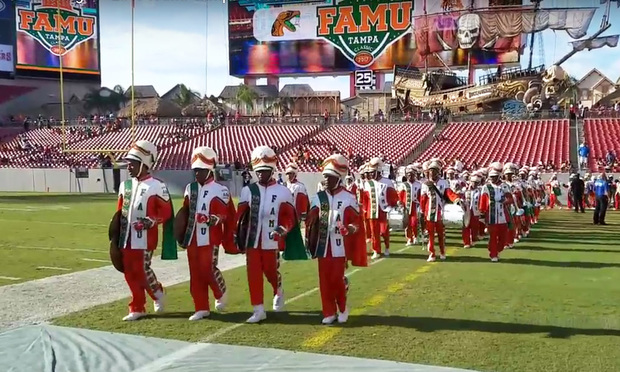Supreme Court Justices Weigh Hazing Law in Drum Major's Death
Lawyers representing a man convicted in the death of Robert Champion, a member of Florida A&M University's renowned “Marching 100” band, tried to convince the Florida Supreme Court that a hazing ritual that resulted in Champion's death was a “competition” authorized by state law.
February 08, 2018 at 02:31 PM
5 minute read

Lawyers representing a man convicted in the death of Robert Champion, a member of Florida A&M University's renowned “Marching 100” band, tried to convince the Florida Supreme Court that a hazing ritual that resulted in Champion's death was a “competition” authorized by state law.
Champion, one of the band's drum majors, died in November 2011 after participating in a decades-old ritual known as “crossing Bus C,” in which band members are hit and slapped as they cross from the front to the back of a bus.
Champion's high-profile death sparked international attention and resulted in the ouster of the historically black university's then-president, James Ammons, and long-serving band director, Julian White.
Dante Martin, a member of the Marching 100 and the “president” of Bus C, was charged with manslaughter, felony hazing resulting in death and two counts of hazing related to Champion's death. An Orange County jury convicted Martin on all counts, and a judge in 2015 sentenced him to 77 months in prison.
Martin, now 30, is an inmate at Wakulla Work Camp, according to the state Department of Corrections website.
Martin's lawyer, Rupak Shah, is asking the state court to overturn the conviction because the ritual was a “competition,” as defined by state law, and therefore exempt from banned hazing activities.
Under Florida law, hazing “does not include customary athletic events or other similar contests or competitions or any activity or conduct that furthers a legal and legitimate objective.”
Shah argued in court filings that the “acts constituting a 'competition' are lawful under the statute and that the jury should find, among other things, that the death of Mr. Champion was an excusable homicide.”
But the justices seemed skeptical of Shah's arguments as they questioned the lawyer Wednesday morning.
“What ordinary, customary competition is there [in] beating of someone?” Justice Peggy Quince asked.
“There are customary events, where beatings, boxing is recognized,” Shah answered.
Justice Barbara Pariente was even more pointed, asking if “hazings are competitions to see who can stay alive and who dies.”
But Shah said the hazing rite met one dictionary's definition of “competition,” which requires “perseverance and endurance to overcome an obstacle.”
Shah's rationale did not appear to satisfy Pariente.
“The idea that you're advancing a theory of competition, that you're equating this with a boxing match or a football game or hockey that gets out of hand, but that's not what this was,” she said later.
Shah nevertheless persisted, repeatedly calling the “crossing of Bus C” a ritual that amounts to a competition.
“It's a contest for honor and prestige, and in those circumstances what happened on this bus could properly be considered a competition,” he insisted.
On Wednesday, several justices also appeared unconvinced by arguments made by Stephen Turner, a lawyer representing the Florida Association of Criminal Defense Lawyers, which filed a “friend of the court” brief in the case.
Turner said the hazing law doesn't cover the marching band's hazing practices because the Marching 100 is not a “student organization” such as a fraternity or sorority. Instead, bands, similar to football teams, are “student activities,” according to Turner.
Turner also pointed out that Champion, whose death came after the annual “Florida Classic” weekend, which includes a football game between Florida A&M and Bethune-Cookman University, wasn't forced to cross the bus.
The drum major willingly participated in the hazing ritual, Turner argued.
“This is just an honored tradition,” Turner said. “Just because a tragedy results doesn't mean that we have to reach out and punish everyone that the statute doesn't apply to.”
But the hazing activity doesn't have to be forced to be a crime, argued Assistant Attorney General Kristen Davenport. And whether the person who was hazed consented is not a defense under Florida law, she added.
“The Legislature has determined it doesn't matter whether he [Champion] wanted to do this,” she told the court. “This statute is trying to protect society from exactly this kind of situation.”
Pariente noted that other band members said they didn't “cross the bus” but felt obliged to participate.
“There's some very strange aspects to this, which are really shaming those that don't do it,” she said.
Davenport also rejected Shah's contention that the anti-hazing law violates constitutional freedom-of-speech guarantees.
“There's no First Amendment right to beat somebody up. There's nothing that infringes on their right to get together, to chant, to march, to make music. What they can't do is beat up one of their members,” she said.
In November 2016, a three-judge panel of the Fifth District Court of Appeal rejected arguments by Martin's lawyers regarding the constitutionality of the state law.
“The defendant asserts that Florida's hazing statute encroaches upon constitutionally protected speech or conduct and, thus, the statute is overbroad; however, he does not articulate how the statute is susceptible of application to speech or conduct protected by the First Amendment. … The defendant has not demonstrated that the hazing statute criminalizes any speech or conduct protected by the First Amendment; therefore, his overbreadth challenge fails,” said the ruling, written by appeals court Judge William Palmer and joined by Judges Thomas Sawaya and Jay Cohen.
In 2015, the family of Champion settled a lawsuit against the university by accepting a $1.1 million payment and an apology from the school.
Dara Kam reports for the News Service of Florida.
This content has been archived. It is available through our partners, LexisNexis® and Bloomberg Law.
To view this content, please continue to their sites.
Not a Lexis Subscriber?
Subscribe Now
Not a Bloomberg Law Subscriber?
Subscribe Now
NOT FOR REPRINT
© 2025 ALM Global, LLC, All Rights Reserved. Request academic re-use from www.copyright.com. All other uses, submit a request to [email protected]. For more information visit Asset & Logo Licensing.
You Might Like
View All
Meta agrees to pay $25 million to settle lawsuit from Trump after Jan. 6 suspension
4 minute read
Executive Assistant, Alleging Pregnancy Discrimination and Retaliation, Sues Florida Healthcare Entrepreneur
3 minute read
Trending Stories
- 1Gunderson Dettmer Opens Atlanta Office With 3 Partners From Morris Manning
- 2Decision of the Day: Court Holds Accident with Post Driver Was 'Bizarre Occurrence,' Dismisses Action Brought Under Labor Law §240
- 3Judge Recommends Disbarment for Attorney Who Plotted to Hack Judge's Email, Phone
- 4Two Wilkinson Stekloff Associates Among Victims of DC Plane Crash
- 5Two More Victims Alleged in New Sean Combs Sex Trafficking Indictment
Who Got The Work
J. Brugh Lower of Gibbons has entered an appearance for industrial equipment supplier Devco Corporation in a pending trademark infringement lawsuit. The suit, accusing the defendant of selling knock-off Graco products, was filed Dec. 18 in New Jersey District Court by Rivkin Radler on behalf of Graco Inc. and Graco Minnesota. The case, assigned to U.S. District Judge Zahid N. Quraishi, is 3:24-cv-11294, Graco Inc. et al v. Devco Corporation.
Who Got The Work
Rebecca Maller-Stein and Kent A. Yalowitz of Arnold & Porter Kaye Scholer have entered their appearances for Hanaco Venture Capital and its executives, Lior Prosor and David Frankel, in a pending securities lawsuit. The action, filed on Dec. 24 in New York Southern District Court by Zell, Aron & Co. on behalf of Goldeneye Advisors, accuses the defendants of negligently and fraudulently managing the plaintiff's $1 million investment. The case, assigned to U.S. District Judge Vernon S. Broderick, is 1:24-cv-09918, Goldeneye Advisors, LLC v. Hanaco Venture Capital, Ltd. et al.
Who Got The Work
Attorneys from A&O Shearman has stepped in as defense counsel for Toronto-Dominion Bank and other defendants in a pending securities class action. The suit, filed Dec. 11 in New York Southern District Court by Bleichmar Fonti & Auld, accuses the defendants of concealing the bank's 'pervasive' deficiencies in regards to its compliance with the Bank Secrecy Act and the quality of its anti-money laundering controls. The case, assigned to U.S. District Judge Arun Subramanian, is 1:24-cv-09445, Gonzalez v. The Toronto-Dominion Bank et al.
Who Got The Work
Crown Castle International, a Pennsylvania company providing shared communications infrastructure, has turned to Luke D. Wolf of Gordon Rees Scully Mansukhani to fend off a pending breach-of-contract lawsuit. The court action, filed Nov. 25 in Michigan Eastern District Court by Hooper Hathaway PC on behalf of The Town Residences LLC, accuses Crown Castle of failing to transfer approximately $30,000 in utility payments from T-Mobile in breach of a roof-top lease and assignment agreement. The case, assigned to U.S. District Judge Susan K. Declercq, is 2:24-cv-13131, The Town Residences LLC v. T-Mobile US, Inc. et al.
Who Got The Work
Wilfred P. Coronato and Daniel M. Schwartz of McCarter & English have stepped in as defense counsel to Electrolux Home Products Inc. in a pending product liability lawsuit. The court action, filed Nov. 26 in New York Eastern District Court by Poulos Lopiccolo PC and Nagel Rice LLP on behalf of David Stern, alleges that the defendant's refrigerators’ drawers and shelving repeatedly break and fall apart within months after purchase. The case, assigned to U.S. District Judge Joan M. Azrack, is 2:24-cv-08204, Stern v. Electrolux Home Products, Inc.
Featured Firms
Law Offices of Gary Martin Hays & Associates, P.C.
(470) 294-1674
Law Offices of Mark E. Salomone
(857) 444-6468
Smith & Hassler
(713) 739-1250







